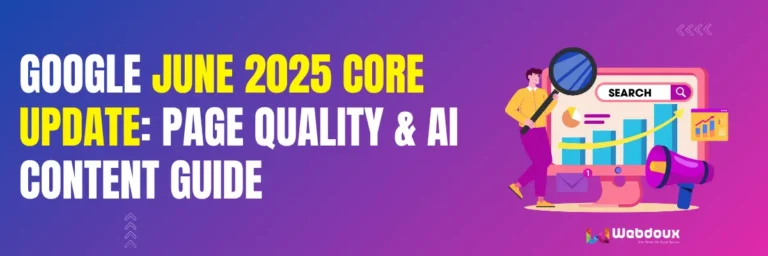
02 JULY Google June 2025 Core Update: Page Quality & AI Content Guide
The latest Google Core Update, launched in June 2025, has sent shockwaves across the digital landscape. This isn’t just a routine algorithm adjustment—it’s a clear and powerful message: Content quality matters more than ever, and now, every individual page on your website is under the microscope.
From user-generated content to the use of AI, and from brand trust to real-world experience, Google has redefined the rules of ranking. Whether you run a blog, e-commerce store, affiliate site, or corporate website, this update should serve as a wake-up call.
From Domain Reputation to Page-Level Precision
Historically, Google evaluated websites holistically, focusing on domain authority, site structure, and overall reputation. Think of it like inspecting your entire refrigerator—ensuring everything looks neat and functions well. This was the model for the March 2025 Core Update.
But with June’s update, Google opened every container in that fridge. Each individual page is now judged on its own merit. Even a single underperforming or low-quality page can impact how your site is perceived.
What’s Being Prioritized: Experience, Authenticity, and Human Insight
1. User-Generated Content (UGC) and Social Proof Are Front and Center
Platforms like Reddit and Instagram are now winning big. Reddit reportedly gained over 160 million new visits in just 10 days prior to the update rollout. Why? Because users are contributing authentic, experience-based content.
Google wants the voices of real people, not SEO-stuffed articles or templated AI blurbs. Expect to see more UGC—like forum posts, reviews, and genuine how-tos—ranking higher than ever.
2. First-Hand Knowledge Beats Generic SEO Copy
Google’s updated guidelines show a strong preference for content backed by personal experience. That means:
Author bios showing real expertise
Case studies
First-person stories and opinions
Verified data and real-world applications
Who’s Getting Hit—and Why
Industries & Sites Most Affected:
Affiliate blogs with templated reviews
Low-effort niche sites without authority
E-commerce product pages with copied descriptions
AI-generated blogs with no human editing
Key Reasons for Rank Drops:
Thin or unhelpful content
Unlinked (orphan) pages
Overreliance on generic AI tools
Lack of E-E-A-T (Experience, Expertise, Authoritativeness, Trustworthiness)
Several industries have already reported traffic losses between 30–50%. If you haven’t audited your site post-update, now’s the time.
AI Content: The Good, The Bad, and The Lazy
Google isn’t banning AI. But it’s punishing lazy use of AI tools—specifically when content is:
Generated in bulk
Lacking editing or personalization
Disconnected from real-world user intent
Human Reviewers Now Play a Role
Google’s January 2025 guidelines explicitly tell human quality raters to assign the lowest scores to generic AI content. This includes pages with no author context, no unique insights, or no added human value.
Smarter AI Use: Tools Like Arvo
You can still use AI effectively—as a co-pilot. Tools like Arvo let you:
Integrate your brand’s voice and tone
Inject your own data and knowledge base
Automatically link related pages
Create SEO-friendly content with a personal touch
AI is still powerful. The difference is whether you’re using it strategically or robotically.
Post-June 2025 Recovery Checklist
If your rankings dropped—or you want to stay future-proof—use this checklist:
Step 1: Analyze Your Traffic and Rankings
Monitor analytics from June 30 to July 17
Compare keyword rankings via tools like Semrush or Ahrefs
Identify content with declining impressions
Step 2: Conduct a Full Content Audit
Remove or improve thin pages
Merge outdated or overlapping content
Add structured data and metadata
Step 3: Boost Internal Linking
Ensure no orphan pages exist
Use AI tools to auto-link content thematically
Step 4: Add Real-World Proof
Include author bios, customer testimonials, use cases
Embed videos, charts, and original images
Use schema for reviews, FAQs, products, and more
What’s Ahead: Prepare for More Google Updates
Frequency is Increasing
Google is rolling out core updates every quarter now.
Expect further AI integration into search via AI Overviews, Featured Snippets, and Discover.
Unified Ranking Across Surfaces
The June update didn’t just affect web pages. It also impacted:
Google Discover
AI Overviews
Video carousels
Featured snippets
Image search
Your content must be multimedia-friendly, well-structured, and contextually rich to stay competitive.
How to Prepare for Future Updates
1. Build Topical Authority
Don’t just cover random keywords. Build content clusters around key themes and link them internally. Become the “go-to” source for your topic.
2. Encourage UGC and Community Interaction
Add comment sections, product reviews, or discussion threads to build freshness and engagement.
3. Emphasize E-E-A-T Signals
Include transparent author bios, credentials, links to social profiles, and third-party trust signals (like press mentions).
4. Focus on Experience-Driven Content
Use real photos, quotes, case studies, and processes. Speak from real-world knowledge, not theory.
5. Monitor AI Overview Impact
Check which keywords are triggering AI summaries. Track visibility dips to adjust content strategy.
6. Stay Proactive with SEO Tools
Use Search Console, Semrush, or SurferSEO to track changes. Watch for early warning signs and don’t wait for traffic to vanish before acting.
Conclusion
Google June 2025 Core Update is a turning point in how content is evaluated. It’s no longer about just ticking SEO boxes or churning out keyword-heavy blogs. The search engine now demands real value, real voices, and real experience.
If you’re using AI, use it with purpose and personality. Treat each page like it matters—because it does. And remember: the goal is not just to rank. It’s to build trust, share knowledge, and offer something no one else can.
WhatsApp us
